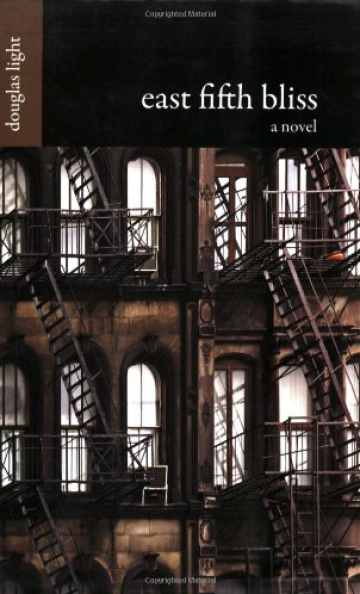KGB Interview: Douglas Light
Douglas Light is rolling, and not just on his Triumph. His first novel, East Fifth Bliss, a coming of age story about a man (Morris Bliss) who should have come of age years ago, has been made into an upcoming feature film starring Michael C. Hall. His second novel Where Night Stops received a 2010 NoMAA Grant. And Girls in Trouble, a collection of his short stories, was recently released by University of Massachusetts Press.
KGB was pleased to slow the New York City based author down a moment to talk about these successes and his writing life.
Q: One of the striking things about your story collection is the language. The stories seem both lush and stark at the same time. There is an economy to the pieces, yet they are beautiful and evocative as well.
A: I definitely subscribe to the belief that a story is complete when every word counts. Less is definitely more.
Q: Abandoned sisters, a hit and run accident, a father with no hand. Your stories aren't bowls of sunshine.
A: (Laughs) Yeah, well, that's true. But I think there's some levity in the pieces. Some absurd humor. The absurdity of life and the situations we wedge ourselves in. Love, family, the desire for wealth, or at least, stability. A lot of things we do make sense to us when we're doing them, but then, when we're divorced from the moment, we end up thinking, “Wow, what was that all about?”
Q: Absurdity of life is a nice segue to my next question. I read somewhere that you were homeless in the early 1990s. Has that experience influenced or served as the basis for any stories you've written?
A: There's a bit about the homeless shelter in my newest novel, which my agent is taking around shortly. But up until now, no. And that's not for lack of trying to write about it. It's been twenty years since I got out, and while I've started a fistful of stories about it, they've all failed. I didn't yet have enough distance on the experience, which I guess I'd best describe as oppressive boredom wrapped tightly in a perpetual state of low-level terror.
Q: And now you have the distance to write about it?
A: Well, now I'm far enough away from the event to see that if there was any grand lesson I learned from that time it's that people are people. The guys at the shelter exhibited the same generosity and the same pettiness that's found in everyone.
Q: Back to your story collection. How did Girls in Trouble come to be?
A: I wrote my first short story in 2002 and was fortunate enough to have to published in the Alaska Quarterly Review. It went on to win an O. Henry Prize and be included in the Best American NonRequired Reading anthology, which was—and still is—unbelievable to me. After five or six years of turning out stories, I noted that most of them dealt with girls or women struggling to find their way in the world. Hence, the title of the collection, Girls in Trouble. I submitted the collection to agents, but no luck. So I started entering it in contests. Peter Ho Davies ended up selecting the collection for the 2010 AWP Grace Paley Prize, which included publication on the University of Massachusetts Press as part of the prize.
Q: Tell me a bit about your writing process.
A: I'd like to say I have it figured out, but I don't. Every time I start a story or novel, it feels like I'm finding my way through the process for the first time. With East Fifth Bliss, my first novel, I ended up writing 1600 pages to get to the 220 or so that finally made it into the book. I'm better at not overwriting now, but it's still a process. I guess the one thing I consistently do is put my time in. I treat writing as a job, and show up every morning—at 4 a.m.—and put my time in. And like all jobs, there are good days and bad ones.
Q: Let's talk about East Fifth Bliss, your first novel. It's been made into a movie starring Michael C. Hall, Peter Fonda, and Lucy Liu. How did that come about?
A: I met Michael Knowles, the director, in the spring of 2007 when East Fifth Bliss the novel had just come out. I gave him a copy. He liked it a lot and asked if I'd be interested in adapting it into a movie with him. And, of course, I was. So over the summer of 2007, he and I would meet at Velvet Cigars in the East Village and work on the script. Five months later, we had a draft. Michael took the script out to L.A. and shopped it around. Through a friend, he got the script to Michael C. Hall in the fall of 2008. Hall loved it and signed on to play the lead, Morris Bliss. Once he had him onboard, everything else started falling in place.
Of course, there were a couple setbacks. Originally, we were to shoot in the spring of 2009 right before Michael C. Hall started shooting Dexter, but he had another commitment. So we pushed it to fall of 2009. Some six or so weeks before we were to shoot, he called to say he had to pull out. He'd just been diagnosed with cancer. Hodgkin's lymphoma. After scrambling around to find a suitable replacement, Michael Knowles, the director, decided to put the shoot on hold and see how Hall's treatment went, see if he'd be well enough to shoot in the spring of 2010. Michael C. Hall battled through his cancer and we ended up shooting the film in the spring of 2010. It's set for theatrical release in March 2012.
Q: Any words of advice on writing?
A: I think everyone has their own way of going about it, so I don't know if any advice I'd offer would be helpful. The big thing I've learned is that the secret of writing is no secret. It's just committing yourself to the work, committing yourself to building on your mistakes. It's finding the question you want to ask and then putting it out into the world.
 Douglas Light's Girls In Trouble will be performed at the Canal Park Playhouse on Monday, November 14 at 7:00 pm. For ticket information: https://web.ovationtix.com/trs/pe/9342735 or visit his site at www.douglaslight.com
Douglas Light's Girls In Trouble will be performed at the Canal Park Playhouse on Monday, November 14 at 7:00 pm. For ticket information: https://web.ovationtix.com/trs/pe/9342735 or visit his site at www.douglaslight.com
